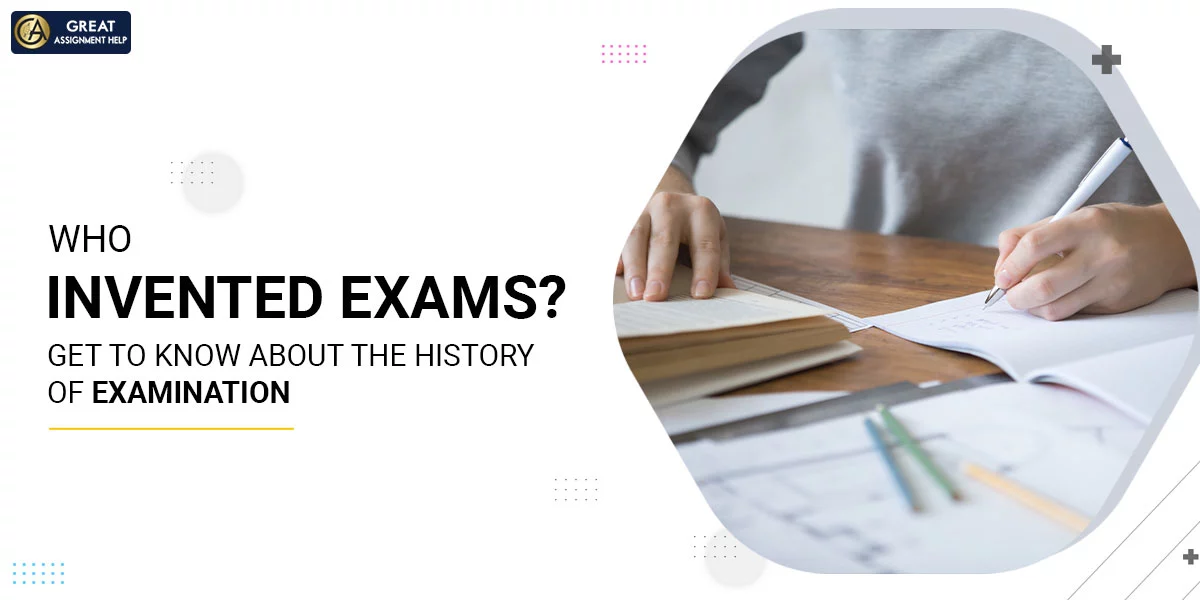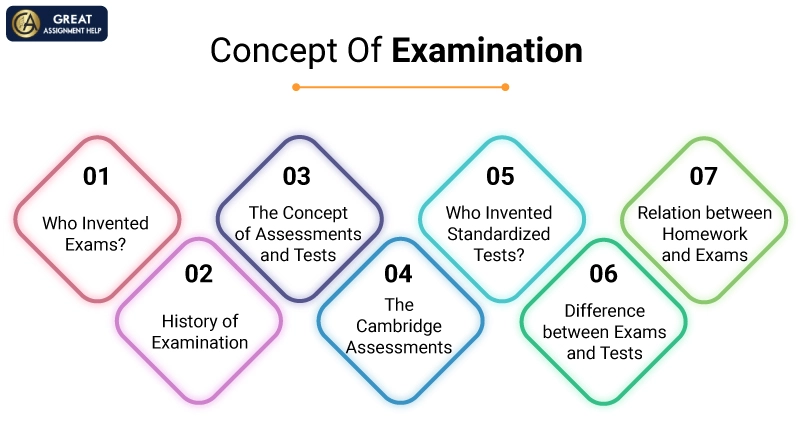Who Invented Exams? The answer might surprise you. One person did not create exams. Ancient China used standardized tests in 206 BCE to select government officials. Over time, educators such as Henry Fischel and others contributed to the development of modern examination systems. Their work has shaped the way we assess knowledge today.
Exams are one of the most horrible parts of academic life. If you are a student, then at least once you would have wondered about the person who invented exams. Right now, are you curious to know who invented exams? Well, in this blog post, let us travel to the past and see who invented the concept of examination and why. Also, here, let us have a detailed look at the history of examination across the world.
What is an Examination?
An examination or exam is a formal test conducted to evaluate a person’s knowledge of a particular subject. Apart from the subject knowledge, it also assesses a candidate’s aptitude, skills, and physical fitness. Mainly, the exams or tests measure all these qualities based on the answers submitted for a set of questions.
The exams are more commonly taken by students of schools, colleges, and universities. During every academic period, they take exams to get a qualification. Its main purpose is to identify the memory, personality, and revision skills of the students. Also, it motivates and helps the students to improve their skills and knowledge.

In general, the exams are of different types. Some common types of examination include open-book exams, oral exams, take-home exams, practical exams, short answer exams, essay exams, MCQs, and case study exams. Often, it is pen-based, but in recent times, after the advent of technology, computer-based exams have come into existence. Usually, the format, mode, and difficulty of the exam vary depending on the requirements, subject matter, and policy of the institution or the governing bodies.
The concept of examination was found in ancient times, and now it has evolved a lot. Continue reading to find the person who is behind the idea of examination, and also get to know about the evolution of exams.

Who Invented Exams?
According to historical sources, Henry Fischel is considered to be the inventor of exams. He was the first person in the world to introduce the philosophy of tests. Henry was a businessman and philanthropist in the 19th century. His idea of examination focused mainly on interior and exterior testing. He proposed that examinations would evaluate the student’s knowledge and understanding of a subject or concept that has been taught to them.
A few other sources state that during the 20th century, the modern-day examination system was founded by another person using the same name, Henry Fischel. But he was a professor of religious studies at Indiana University.
History of Examination
Would you like to know about the history of examinations around the world? Here, let us have a closer look.
Actually, the first country to implement the concept of examination was Ancient China. To select people for government jobs, the country’s government conducted a national assessment in the name of the imperial examination. The exam was initially set up by the Sui Dynasty in 605 AD. But later, in the year 1905, China abolished the appointment system through exams.
After China, in the year 1806, England adopted the examination system to identify the candidates who were eligible to serve in the Majesty’s Civil Service. But after a few years, the concept of assessment was applied to academics. In the education field, examinations became a popular tool for teachers to test the knowledge and skills of students in an academic session.
Finally, the idea of using examinations in the educational system spread to all parts of the world, and many countries started following it in various ways. Even today, each country follows different examination types depending on its educational system. However, it was Henry who introduced the core idea of exams into education. Hence, Henry Fischel is considered to be the founder of examination.
Get to Know the Concept of Assessments and Tests
In the modern day, the examination system has changed drastically and has evolved into different tests and assessments like personality tests, term papers, multiple-choice questions, research papers, and essay assessments. Especially, in certain scenarios, the students are tested by combining different evaluation types. Other than for educational purposes, many organizations also use holistic testing for job interview processes. Basically, holistic testing considers a lot of individual components into account to identify the actual competency of a person.
The Cambridge Assessments
When speaking about assessments, it is necessary to mention the role of Cambridge University. At the global level, the Cambridge assessments are treated as one of the most reputable and trusted assessment systems. But do you know the interesting history behind it?
At the end of the 19th century, English schools requested that Oxford and Cambridge universities prepare standardized tests for young males in England. During that time, only boys were allowed to attend examinations.
The first Cambridge assessment was conducted on 14 December 1958 at churches and schools across England. The assessment mainly covers subjects such as Mathematics, English, History, Latin, German, French, Politics, etc. In order to assess the students, external invigilators from different parts of the country participated.
Even today, the university puts a lot of effort into modern-day tests and exams, and that is the main reason why Cambridge assessments are considered to be reputable.
Who Invented Standardized Tests?
Each country follows a different examination system. But the standardized testing is one of the effective methods that is still practiced worldwide. Do you know who invented standardized tests? It was Frederick J. Kelly who founded the first multiple-choice exams. He didn’t want the students to make interpretations, and that is why he designed the standardized tests with no ambiguity.
Read More: How to Study Online for Competitive Examinations
Benefits of Conducting Exams for Students
For students, examinations are a source of anxiety and frustration. Basically, exams are not meant to push the students into depression; they are mainly conducted to create a sense of responsibility among the learners who understand the concepts better and clearly present them. Mentioned below are some common benefits of conducting examinations for students in schools, colleges, and universities.
- Promote competition among students.
- Force the student to work harder.
- Enhance the learning skills of students.
- Help to attain scholarships.
- Improve the knowledge and memory of students.
- Make students more confident.
- Help students manage time effectively.
Exams vs. Tests: Major Differences
As a part of your scholarly life, you would have often heard the two terms examination and test. But do you know the difference between exams and tests? Here is a comparison between the two.
- The exam is a formal format, and the test is an informal format.
- An exam is usually conducted at the end of an academic year to evaluate the overall performance of the student. Students can obtain a qualification only if they get a pass mark in the final examination. But that is not the case with the tests. In order to prepare the students for the finals, several tests will be conducted throughout the academic year.
- If you fail an exam, you have to start the course again or retake the exam. In case you score poorly on a test, you have to make up for it only by performing well in the next one.
Homework vs. Exams
In schools and colleges, students will be frequently asked to submit homework and assignments. Most schools give homework daily to help the students understand the concept. Generally, homework acts as a preparatory ground for exams because if students regularly do homework, then they can retain their knowledge. Also, for those who dedicatedly themselves to completing homework or assignments, exam preparation would become much easier.
Conclusion
For students all over the world, writing homework is burdensome. So, some countries have banned homework. But still, in a few countries, some educational institutes would assign extra marks for homework and would include those marks while calculating the overall scores of the exam. If you are a student who is a part of such a strict education system, then you can’t escape from completing homework. To boost your academic scores in the final examination, you will have to prepare top-quality assignments as per your teacher’s requirements. From simple classroom projects to tough research projects, we provide excellent assignment writing help for both school and college students. Our professional academic writing service includes essay writing, research paper writing, speech writing, presentation creation, etc.



